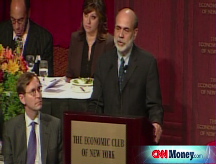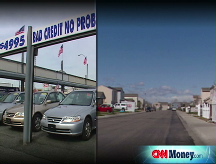Stocks fight back
A volatile session turns positive as lowest oil prices in a year give investors a reason to jump back into the market.


NEW YORK (CNNMoney.com) -- Wall Street rallied Thursday, finding momentum toward the end of a volatile session, as the lowest oil prices in more than a year gave investors a reason to scoop up shares battered in the recent market selloff.
The Dow Jones industrial average (INDU) surged 401 points, after having fallen as much as 380 points in the late morning.
The Standard & Poor's 500 (SPX) index rose 4.3% and the Nasdaq composite (COMP) gained 5.5%. The gauges were on both sides of the breakeven point throughout the morning.
After the close, Google (GOOG, Fortune 500) reported higher-than-expected third-quarter earnings on revenue that was in line with forecasts. The search engine's shares rose 12% in after-hours trading. (Full story)
Also after the close, AIG (AIG, Fortune 500) said it has tapped another $12 billion in emergency government funding, bringing its total to $82.9 billion as it struggles to stay afloat. (Full story)
Also after the close, Advanced Micro Devices (AMD, Fortune 500) reported a narrower quarterly loss, while IBM (IBM, Fortune 500) reported higher profit that beat estimates, after pre-announcing the results last week.
Friday brings reports on housing starts and building permits in September as well as the University of Michigan's consumer sentiment index for early October. Additionally, President Bush is due to speak briefly before the market opens.
Stocks seesawed Thursday in another very volatile session on Wall Street in which traders eyed more hints that a recession is underway but also opted to take advantage of the recent bloodletting in equities.
Stocks fell in the morning on a pair of weak manufacturing reports and Merrill Lynch and Citigroup's losses. But the selling eased up after the major gauges dipped close to last week's multi-year lows - which some market pros think could represent a bear market bottom.
In the last hour of trade, stocks rallied sharply, reversing the recent trend of selling off near the close. The stock market also seemed to benefit from a slump in commodities, with investors ignoring the negative economic implications of sliding oil prices.
The dollar strengthened versus other major currencies and the credit market showed some signs of loosening, as several key lending rates declined.
While investors have welcomed many of the steps the government and world banks have taken to get money flowing again, the tone of the market has remained pretty negative. That's partly because a lot of the programs won't kick in until several months from now.
Investor fear is at an all-time high, with the CBOE Volatility (VIX) index, or the VIX, rising to a record 81.17 Thursday afternoon before pulling back a bit.
"To a certain extent, we're in the middle of a hurricane," said Gary Flam, portfolio manager, Bel Air Investment Advisors. "It will pass eventually and we will get through it, but there's been a lot of damage."
Year-to-date, the Dow, S&P and Nasdaq are all down between at least 30%.
Recession talk sent the Dow tumbling 733 points Wednesday, its second worst session ever on a point basis. The slide of 7.9% was the Dow's 9th worst ever. Declines for the S&P 500 and the Nasdaq were comparable. The decline Wednesday wiped out $1.1 trillion in market value on the Dow Jones Wilshire 5000, the broadest measure of the stock market.
Oil: Oil prices continued to slide after the government's weekly inventory report showed a bigger-than-expected gain in crude and gas supplies.
U.S. light crude oil for November delivery fell $4.65 to settle at $69.85 a barrel on the New York Mercantile Exchange. The contract fell as low as $68.57, the lowest level since August 2007.
Bets that demand is slowing have sent oil prices lower since crude hit an all-time high of $147.27 a barrel on July 11. So far, instead of providing relief to investors, the decline has been seen as another indication of the global economic slowdown.
But investors seemed to ignore those implications in the late-session rally Thursday, also setting aside the morning's weak economic reports.
Economy: Production at U.S. factories fell by the largest amount in nearly 34 years, the Federal Reserve said Thursday. The decline was due largely to the impact of hurricanes Gustav and Ike on the Gulf Coast industry. (Full story)
Meanwhile, the Philadelphia Fed index, a regional reading on manufacturing, fell in October to an 18-year low of negative 37.5 from a reading of 3.8 in September, versus forecasts for a drop to negative 5. Any reading that is negative suggests weakness and a number this negative could suggest recession.
The September Consumer Price Index (CPI) showed only modest inflationary pressure. CPI was flat, versus the 0.1% rise economists surveyed by Briefing.com were expecting. So-called "core" CPI, which strips out volatile food and energy prices, rose 0.1% versus expectations for a rise of 0.2%.
The number of Americans filing new claims for unemployment last week fell to 461,000 from a revised 477,000 the previous week. Economists thought claims would fall to 470,000.
In other news, mortgage rates spiked last week, seeing the biggest week-to-week jump since April 1987. (Full story)
Financials: Citigroup and Merrill Lynch both reported big quarterly losses, due to steep credit and mortgage-related writedowns.
Citigroup (C, Fortune 500) reported a loss of $2.8 billion, or 60 cents a share, versus a profit a year earlier. However, analysts were expecting an even bigger loss of 70 cents, according to Thomson Reuters. Shares fell 2%. (Full story)
Merrill Lynch (MER, Fortune 500), which is being bought by Bank of America (BAC, Fortune 500), reported a loss of $5.2 billion, or $5.58 per share, versus a smaller loss a year ago. Analysts had forecast a loss of $5.22 a share. Shares ended barely higher. (Full story)
Credit market: Lending rates have improved slightly this week following a series of initiatives on the part of the U.S. government and banks around the world to get money flowing through the system again.
Libor, the overnight bank-to-bank lending rate, fell to 1.94% from 2.14% late Wednesday, according to Bloomberg.com. The three-month Libor, what banks charge each other to borrow for three months, fell to 4.50% from 4.55% Wednesday.
The Libor-OIS spread, a measure of cash scarcity, stood at 3.40%, barely changed from 3.41% Wednesday.
The TED spread, which is the difference between what banks pay to borrow from each other for three months and what the Treasury pays, narrowed to 4.08% from 4.31% late Wednesday. The spread hit a record 4.65% last week. The wider the spread, the more reluctant banks are to lend to each other.
Credit froze up in the wake of the housing market collapse, subsequent subprime lending fallout and contraction in the bank sector. The lack of available credit has punished the already weak economy, making it difficult for businesses to function on a daily basis and for consumers to get loans.
The Federal Reserve has made potentially trillions of dollars available to banks. Earlier this week, the U.S. government said it would invest at least $250 billion in the nation's banks as part of the $750 billion bank bailout plan.
One sign of business lending showed it remains pinched. (Full story)
Treasury prices inched higher, lowering the yield on the 10-year note to 3.93% from 3.95% late Wednesday. Treasury prices and yields move in opposite directions.
The yield on the 3-month Treasury bill, seen by many as the safest place to put money in the short term, rose modestly to 0.40% from 0.23% late Tuesday. The low yield shows investors are still willing to take a meager return on their money rather than risk the stock market. Last month, the yield on the 3-month bill skidded to a 68-year low around 0%.
Other earnings: After the close Wednesday, eBay (EBAY, Fortune 500) posted a higher-than-expected quarterly profit, but warned fourth-quarter results won't meet forecasts. Shares fell 6% Thursday.
On Thursday, Nokia (NOK) reported weaker quarterly sales that missed forecasts and weaker earnings that met forecasts. The Finland-based mobile phone maker also said it expected sales to rise in the fourth quarter and said that this could help it boost its market share. Shares gained 4%.
Google (GOOG, Fortune 500) slipped ahead of its earnings report, due after the close today. The Internet search leader is expected to post higher quarterly sales and earnings. However, the slowing economy has likely hurt its advertising sales. (Full story)
Other markets: Global markets tumbled following Wall Street's big retreat on Wednesday, with the Japanese Nikkei slumping 11% and the London FTSE down 5.4%.
Gasoline prices fell another 4.1 cents overnight, to a national average of $3.084 a gallon, according to a survey of credit card activity by motorist group AAA. It was the 29th consecutive day that prices have decreased - in the past month alone, they're down more than 73 cents a gallon.
COMEX gold for December delivery plunged $34.50 to $804.50 an ounce. A variety of other commodities declined as well.
In currency trading, the dollar rose against the euro and the yen. ![]()




